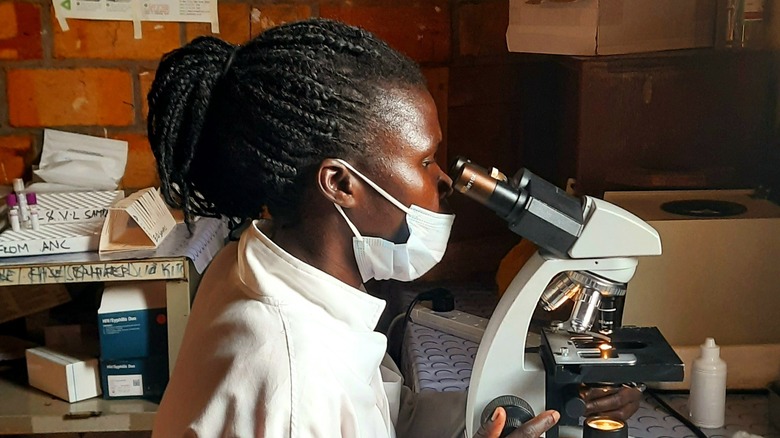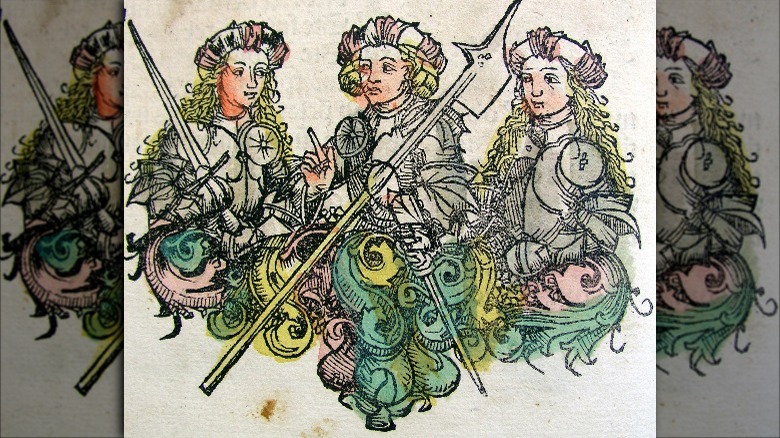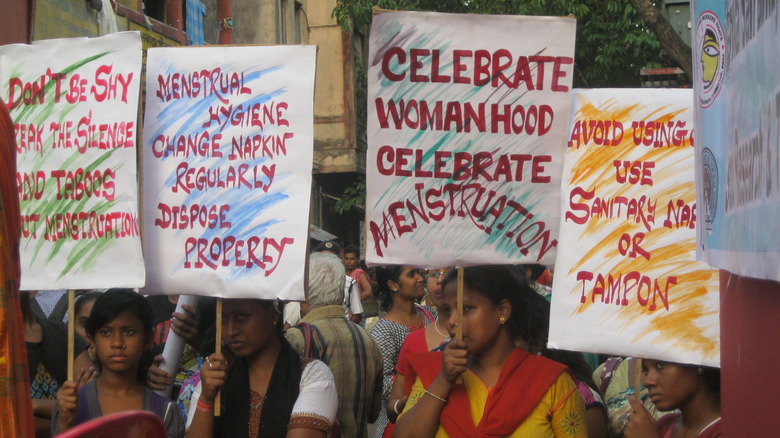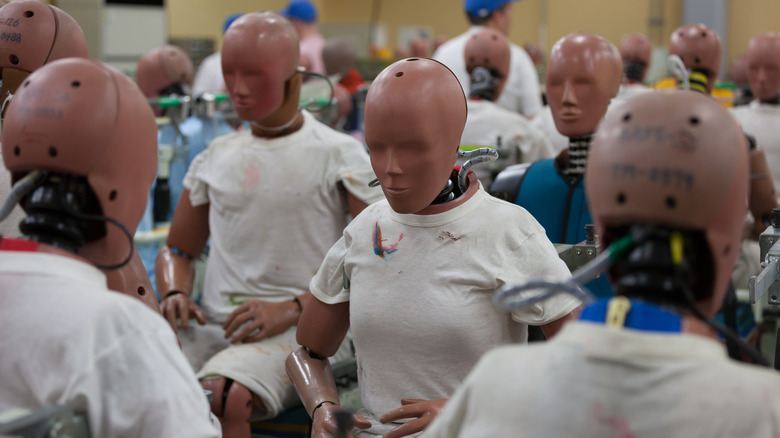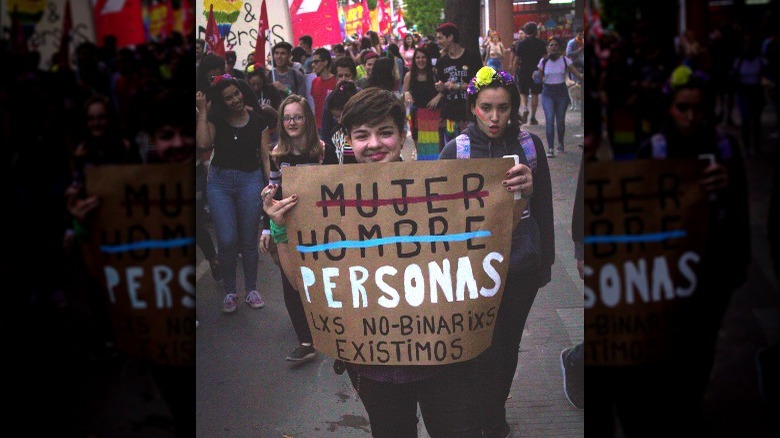What Would Happen If Men No Longer Existed?
For decades, science fiction writers have been digging deep on a trope: what would happen if all of the men in the world stopped existing? It's a pretty rich vein to mine, both in fiction and in wider speculation. In this thought experiment, don't concentrate so much on how men disappeared, whether it was due to disease, a failing Y chromosome, or the sudden finger-snap of a power-mad alien demigod. Instead consider the aftermath — how would the rest of us carry on if men stopped existing?
For practicality's sake, assume that this disappearance targeted people who were born biologically male with XY chromosomes. Of course, science and history has already shown that there are plenty of humans who don't fit neatly into that category. It's also worth noting that an event like this would be accompanied by widespread upheaval. Humanity would find itself dealing with an emotional trauma of a sort it has never before experienced, and it could tip it into a period of intense chaos and uncertainty as society was forced to dramatically restructure.
But, once the dust had cleared, what would the world really look like? It's tempting to dip into gendered stereotypes — for example, many sci-fi takes on this scenario envision a world without war, assuming that women are more peaceful than men — but are those stereotypes backed up by real world evidence? What would happen if men no longer existed?
We would see the first truly matriarchal societies
Much is made of matriarchies, social structures where women completely dominate and direct the path of their communities. Some researchers have even proposed a quasi-mythical prehistoric matriarchy, where women were at least as equally important as men, if not more so. However, some criticism, like that shared via the New York Times, argues that there's little evidence for the existence of female-dominated society before recorded history. And even cultures that get the label of "matriarchy" today typically still make some room for men in leadership and family roles, meaning that a completely women-led society is elusive.
If men were to disappear, however, there would be no choice but for every society worldwide to suddenly become a matriarchy. What would that look like?
Consider the Mosuo culture of Tibet. According to the Guardian, in this culture, family descent is traced entirely through the female line, with children considered the product of the women only. Men are understood to have lent a helping hand in the children's making and little more. However, they are expected to act in support of their sisters' children. Women make all the big decisions (often ultimately left to an elder female relative). Traditionally speaking, marriage between two individuals isn't practiced, though the encroachment of outside culture is changing this standard. It's possible that, in a truly man-free world, many cultures would look similarly, perhaps with aunties and other female relatives in traditionally male roles.
Reproduction could still continue with scientific help
When it comes to reproduction and continuation of the species, it might be rather lucky that biological men stopped existing rather than women. The science of creating children without male gametes (sperm) may be further along than you realize.
As the BBC reports, scientists have already produced fertilized mouse eggs that were made with genetic material taken from two female mice. Stem cells from one parent were pushed to become sperm cells. Smithsonian Magazine reports that seemingly healthy baby mice were born from the process, but they may have deficiencies that haven't been discovered, and it's unclear how well this technique would work in humans. Would the resulting embryo develop normally? Much remains to be seen, though it's easy to imagine that funding for this sort of research would seriously increase if biological men went extinct.
Some say that this may be an issue that our species will have to face, though not for a long time. According to the Conversation, researchers have already noted that the Y chromosome has a fatal flaw — in a human body, there's only ever one copy. That opens it up to potentially dangerous mutations and, over time, seems to have led to the chromosome's degradation. If predictions are correct, it could disappear within 4.6 million years. That's not guaranteed to happen, but it is possible that lab-assisted reproduction will become more common, even if men don't vanish.
Cloning could become more prevalent, but not without complications
Another reproduction strategy in this new world may be to use cloning. That's a key plot point in the short story, "Houston, Houston, Do You Read?", in which time traveling male astronauts learn that a now all-female human species reproduces largely through a series of clone lineages, according to the Great Courses.
So, why wouldn't this hypothetical scenario work? After all, we've already cloned numerous animals, from the famous sheep named Dolly to Barbra Streisand's two cloned Coton de Tulear dogs (via the New York Times). Why couldn't it happen just as readily in humans, especially if we were facing extinction otherwise?
In this situation, some of the current ethical concerns about human cloning might be loosened, but there would still be some serious issues involved, as the Proceeding of the National Academy of Sciences notes. Cloned mammals appear to be more vulnerable to limb abnormalities, obesity, immune disorders, and more. In fact, Dolly the sheep, the first animal cloned from an adult cell, was euthanized in 2003 after suffering from serious lung disease and arthritis. Subjecting humans to that process is today considered highly unethical. Cloning also opens up questions about eugenics and what traits "deserve" to be reproduced. Scientists would have to overcome these serious hurdles first before reproductive cloning became a viable strategy in a post-man world.
Environmental and population pressures might ease
If reproduction slows down, then it naturally follows that the numbers of humans currently living on our planet would plummet dramatically. That would be a serious upheaval for our society, to be sure, but it may allow the Earth to breathe more easily in more ways than one.
First, of course, is the bare fact that the fewer people there are, the less damage we can collectively do to the environment. That's not to advocate for a Thanos-style solution to our current issues, but it's reasonable to believe that we'd see some serious changes in the environment if half the species stopped existing. The Australian Academy of Science notes that there is a strong link between the ever-increasing human population (which advances by an estimated 74 million people every year), our consumption of resources, and the impact on the planet.
And, with only women left in charge of the planet, environmental movements might really get underway. For one, according to the Yale Program on Climate Change Communication, women tend to take climate change more seriously than men do. Women surveyed were especially concerned about the impact climate change would have on future generations and the planet, as well as the health effects of pollutants. So, it stands to reason that, if all world governments were run by women, we would be more likely to see increased research and action on climate change, like greenhouse gas regulations and investment in renewable energy.
We might see less violence but it probably wouldn't disappear
The idea of a peaceful, all-woman utopia has been so frequently deployed in science fiction that it's become a bit of a tired cliche in the genre. The notion is so prevalent, in fact, that a casual survey of forums and websites considering the idea of a world populated only by women shows that many seem to take this as an obvious fact. A world without men would be less violent — right?
First, it's true that, on the whole, men are far more likely than women to commit violent crime, as the Conversation reports. Men also make up the majority of prisoners across the globe. Are men innately more violent? Researchers suggest that, while some aggression may be linked to biology, it's better explained by socialization. Essentially, many cultures actively or passively encourage men to react to stressful situations with violence.
But that's not to say that violence would totally disappear in a world without men. Time reports that women have been found to be aggressors in situations of domestic and intimate partner violence. And same-sex couples aren't immune to this issue, either, with a report from the Center for American Progress noting that domestic violence amongst the LGBTQ community is a serious issue. It's also possible that, in a patriarchal culture where women's anger and aggression are routinely downplayed, so, too, would be their violent acts. There would very likely be no such screen in a world lacking men.
War could still happen under female leadership
If many sci-fi creators have indulged in the trope of a peaceful female utopia because they believe women are inherently more peaceful, then surely just as many believe that a group of all women leaders will lead us away from war forever. But is that true?
Going off of real-world data, the answer is pretty complicated. Some research suggests that women in power are less likely than their male counterparts to use violence and take a more collective approach, according to Quartz. Yet, it's notable that this is all marred not only by stereotypes that often paint all women as gentle and nurturing, but by the fact that we have an awfully small sample size. There just aren't enough women leaders to make solid conclusions here.
Of course, there's also the caveat that even the most independent and powerful female leaders are still operating in a world whose political rules have been largely established by men. The Washington Post says that this may explain why countries with female leaders are more likely to engage in violent disputes — these female leaders have something to prove. Would Margaret Thatcher have entered into the Falklands War if she were only one woman in a long line of female leaders? Would she have maybe felt less like she had to prove herself if her predecessors, cabinet ministers, and colleagues in other nations weren't overwhelmingly male?
Pink collar jobs would be no more
Pink-collar jobs — roles traditionally held by women, such as nursing, teaching, and administrative work — would, naturally enough, no longer be labelled as such. Indeed, all careers everywhere would become pink-collar jobs, given that the only people available to fill them would be female. Ultimately, we'd be forced to discard ideas of jobs segregated by gender. All teachers and hair stylists would be women, sure, but so too would all the automotive mechanics and firefighters (it's safe to assume there would still be cars and fires in this world, after all). We might also see significant changes in work flexibility and family leave policies, giving employees more of a chance to both raise families and advance their careers at the same time.
In today's world, jobs that tend to be dominated by women tend to pay significantly less than those dominated by men, according to Forbes. And even when women enter into practically the same fields and roles as men, they're consistently paid less for the same kind of work.
The New York Times reports that, when more and more women work in a given field, the average pay tends to drop dramatically. Conversely, in careers that were once the domain of women but that have become male dominated over time, like computer programming, the pay and prestige has risen. Meanwhile, some pink-collar work, such as administrative support, is in danger of falling to automation, as CBS News notes.
Period poverty could be a thing of the past
Worldwide, period poverty is a persistent problem that not only leaves a significant number of girls and women without access to menstrual products , but may significantly affect their long-term career and educational goals. In some cases, girls are compelled to stay home from school while having their period because they don't have access to products, running water, or even toilet facilities (via UNICEF). The University of Michigan School of Public Health reports that part of the problem stems from long-standing stigma surrounding menstruation. Historically, the issue has been ignored in part because it might make some people uncomfortable.
Now, a world without men does not necessarily mean that every single person left behind would menstruate. Some would be too young, others would be post-menopausal, and still more might have medical conditions that keep them from menstruating regularly or at all. Some women may still choose to stay on birth control, which not only prevents pregnancy, but can also help to regulate or even totally suppress menstruation (via Children's Hospital of Philadelphia).
But in a world without men, there would be a significant number of people having regular periods who would need regular access to menstrual products, for hygiene and to ensure dignity and access to opportunities. Perhaps, in this world, the existing squeamishness would vanish, we'd all accept that people would need pads, tampons, or other menstrual products on occasion, and a normal biological process would be a non-issue.
The way our world is designed would change
When discussing a world without men, the question of heavy lifting often arises. Who would haul stuff around? Yet, a simple look at everyday life shows that even male construction workers very often use mechanical assistance to lift heavy loads, dig holes, and demolish buildings. After all, even if you were a heavily muscled person, wouldn't it make more sense for you to save both time and energy and use a backhoe to dig a trench instead of grabbing a shovel and doing it by hand?
It follows that, in a world where the only humans left have two X chromosomes, this sort of mechanical help would continue. Other ways in which our world is designed could also change dramatically. Safety and medical testing would be designed with women in mind and wouldn't be dominated by data drawn only from men. In the past, where that's been the norm, and the outcomes can be genuinely dangerous for women. There are cases where protective equipment wasn't designed to fit female bodies and crash test dummies were exclusively male, leading to poorly designed seat belts and safety harnesses for women (via the Guardian).
The BBC reports other serious issues encountered by women as they try to manage military body armor designed for men, CPR dummies that don't account for breasts, and even office temperature settings that are far too cold for many women's comfort.
Gender stereotypes would undergo a serious reckoning
Let's assume the future of our species is assured. Scientists have figured out a reliable method of reproduction that doesn't require Y chromosomes. Women take the reins of governments everywhere. Schools still operate, roads are maintained, the economy continues onward, and we can all more or less agree on office AC temperatures. Humans, though dramatically changed, are here to stay.
But what about gender? In a world populated by both men and women, gender is often a primary concern. First, a key distinction: per the Canadian Institutes of Health Research, "sex" refers to biological sex, while "gender" is a set of social norms that are, to a significant extent, manufactured by people and which can dramatically change over time. Witness, for instance, a toddler Franklin Delano Roosevelt sporting a frilly dress and then compare the sight to the often dramatically gendered world of baby clothes today (via Smithsonian Magazine).
For better or for worse, people in our existing world have built part of their lives around how they believe men and women should act. But, without men, could gender binaries exist? And what would those left behind do with gender? It could be that people would cling to gender norms that brought them a sense of stability and comfort. But our entire understanding of gender might change in this new world. Perhaps, like Scientific American argues, we could even discard much of what we assume about gender and get rid of artificial limitations.


